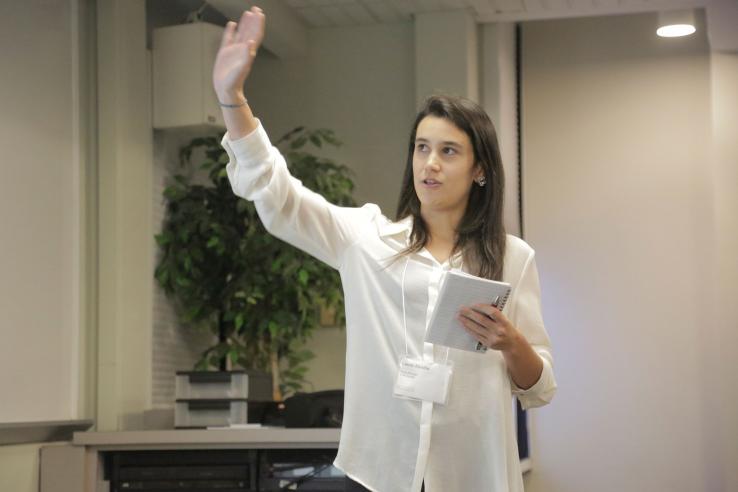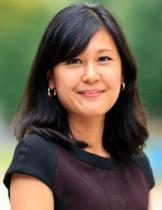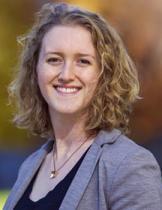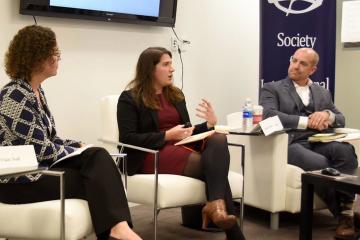
Laura Abadia, J-PAL ’19, on her path from J-PAL Europe to the OECD

The Alumni Spotlight series highlights J-PAL alumni who are making an impact across industries and around the world. To nominate a J-PAL alum to be featured in a future Alumni Spotlight, please fill out this form.
In the next installment of our Alumni Spotlight series, we speak with Laura Abadia, a former Senior Policy Manager at J-PAL Europe. Laura joined J-PAL Europe after working in sub-Saharan Africa and spent nearly six years at J-PAL building the office’s presence in the region. Now working for the OECD Development Centre, she reflects on how her experiences have brought her to where she is today, and shares with us some of the interesting work she is doing as part of her new role.
Can you tell us about your background and how that led you to join J-PAL Europe?
I came across J-PAL during my time in undergrad, when I was managing a microfinance project to help households in Burkina Faso gain access to clean cook stoves. As part of my research, I came across an early paper by Esther Duflo and co-authors on the subject of air pollution, and this is how I first discovered randomized evaluations.
A few years later, after completing my studies at Sciences Po Paris and the London School of Economics, I had the opportunity to work on fascinating projects to strengthen public health systems in sub-Saharan Africa. I met doctors, epidemiologists, and social care workers, but the experience left me with many more questions about how best to improve these systems.
When I saw a job opening at the J-PAL office in Paris, I did not hesitate to apply. The position was an ideal match as it combined my interest in gaining a deeper understanding of how to tackle tough social policy questions and my interest in Francophone Africa.
Could you tell us a bit about some projects you worked on during your tenure at J-PAL that you were particularly excited about?
I spent a large chunk of my time putting together the building blocks of what would become the European Social Inclusion Initiative (ESII). Working with two primary investigators and two PhD students, we did an exhaustive literature review of the three levers of social inclusion: education, employment policies for young people, and migrant inclusion.
This review helped us realize that there was a research gap in the field and also a very promising opportunity to look deeper into migrant education for inclusion. This was how ESII was born. It was officially launched just after I left J-PAL Europe in the spring of 2019, and I am looking forward to seeing the exciting research that will come from it.
Another project that I managed was piloting the Teaching at the Right Level program, led by J-PAL and Pratham in Francophone Africa.
I was involved from start to finish, including the initial conversations and the learning journey with government representatives from Burkina Faso and Côte d’Ivoire to visit the Pratham program in India. I collaborated with the Ministry of Education of Côte d’Ivoire and pedagogy and language experts to conceive the program materials and monitoring strategy, and after several months I was able to see the pilot come to life. This was definitely a very exciting policy project to have been involved in, and I have great hopes for it to grow and reach more schools over the next years.
During your time at J-PAL Europe, you worked on a variety of social programs and engaged broadly with the policy and research community, both in Europe and francophone Africa. Have you seen priorities for certain issues or programs change over this time?
Looking through the ESII lens, I think that an exciting and emerging research topic in Europe relates to what programs or policies governments and NGOs can implement to help build more cohesive societies to prevent violence and extremism. For example, interventions that can be implemented in the classroom can foster students’ sense of belonging to society.
There are ongoing randomized evaluations led by J-PAL affiliates and others in several European countries to determine whether school-based programs can enhance students’ social competencies and civic values.[1] With the inflow of migrants and the unfortunate events that occurred in Paris and in other European cities in recent years, policymakers and researchers are concerned about how to build common values and cohesiveness in our societies.
Tell us a bit more about your new role at the OECD Development Centre in Paris. Is there any overlap with the work that you used to do with J-PAL Europe?
The OECD Development Centre brings together OECD member countries and other low- and middle-income partner countries. At the Centre, I work in a division called the Network Partnerships and Gender Division, which is the entry point for non-state actors who are active in developing countries and who want to engage with OECD experts, member countries, and each other.
My responsibilities focus on education and health in two streams of work. I coordinate with foundations investing in education and health, OECD experts, and partner governments. Together we design funding strategies that are aligned with national priorities and underpinned by scientific evidence. We also produce new research at the intersection of education, health, and philanthropy.
In addition to this work, I am part of the team tasked with conceiving a novel country-level assessment that looks at the interlinkage of discriminatory gender norms and girls’ education in sub-Saharan Africa. Although there is meaningful overlap with the work that I used to do at J-PAL, the main difference is that I have less contact with the field and I work more directly with data.
Are there any skills that you picked up along the way that are relevant to the work that you do at the OECD today?
Yes, both hard and soft skills. Working at J-PAL makes you an excellent writer, as my editors have noted! You also learn to be a good public speaker– knowing how to engage with actors at different levels across different domains is a soft skill that definitely applies to my work at the OECD.
Something else that I have found very useful in my current job is that J-PAL helped me absorb the literature and understand how debates in education and health are framed in development contexts. Having this knowledge is incredibly helpful whenever you are leading a conversation with other colleagues, foundation members, or with governments. The challenge now is staying up to date with the literature!
If I were to give advice to someone interested in working at a multilateral organization like the OECD, I would say that having field experience and being able to speak several languages are definitely a plus, as this gives you context about how policies are actually implemented and broadens your opportunities with respect to the projects/regions you can get involved with.
[1] This project is led by Marc Gurgand (PSE), Eric Maurin (PSE), S. Briole (PSE) and takes places across several countries. For more information please visit: http://www.sociedadyeducacion.org/en/news/society-and-education-will-evaluate-the-program-active-citizenship-projects-to-enhance-pupils-social-and-civic-competences-act/



